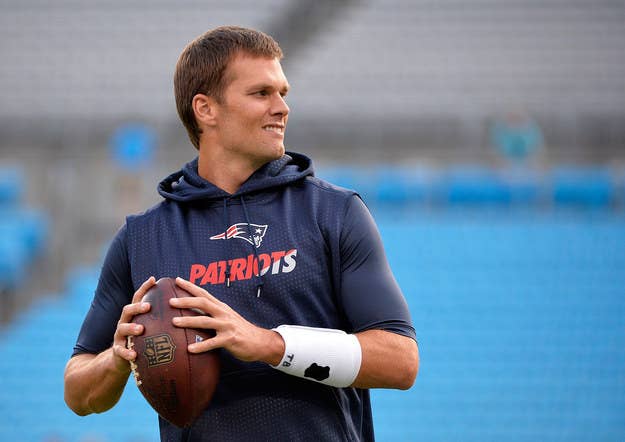
Lawyers for the NFL and New England Patriots quarterback Tom Brady failed to reach a settlement Monday in the deflategate case after a 40 minute meeting in a federal judge's chambers in Manhattan.
Judge Richard Berman said "they tried quite hard" and "I have no qualms about either's side's efforts." He said he "fully expects to rule by Friday" but said it is more likely he will rule Tuesday or Wednesday.
The player's union attorney, Jeff Kessler, said, "we trust the court to proceed in a just result."
The case before Judge Berman is a lawsuit brought by the NFLPA for Tom Brady against the NFL that disputes the power with which Commissioner Roger Goodell acted when ruling on the quarterback's appeal of his four-game suspension.
The parties first met in court August 12 - the same day a courtroom sketch artist produced an unflattering rendering of the usually handsome football player. Neither Goodell nor Brady attended a second hearing on August 19 during which Judge Berman said that if the NFL and the NFL Player's Association could not settle the matter, he would issue a decision by September 4 -- that's less than a week before the Patriots kick-off the season against the Pittsburgh Steelers.
The judge has required that both Goodell and Brady attend Monday's hearing.
The seven month long deflategate saga started on January 18 when the Patriots were accused of using underinflated balls during the AFC Championship game against the Indianapolis Colts. NFL officials later said they determined that the Patriots' game balls had been deliberately underinflated to give Brady and his teammates a competitive advantage.
Judge Berman has questioned both parties about the footballs but the legal base of the dispute is in power and labor.
After the NFL hired an independent investigator, Ted Wells, who determined that Brady was at least "generally aware" of a scheme to tamper with game-day footballs to gain a perceived competitive advantage, the star quarterback was issued a four game suspension by the league. He appealed the suspension, and the NFLPA asked Commissioner Goodell to recuse himself as arbitrator, which he refused.
Following a 10-hour appeal hearing on June 23 at NFL headquarters on Park Avenue in Manhattan, Goodell upheld Brady's suspension, citing new evidence: During Wells' investigation, Brady refused to turn over his cell phone, claiming privacy concerns, and then it was "destroyed" (which Brady claims is routine). The NFLPA claims Brady was never made aware that he could be punished for not turning over his phone.
After Brady's suspension was upheld, the NFLPA filed a federal lawsuit challenging Goodell's unilateral power as disciplinarian and arbitrator. The NFL claims Goodell is well within his realm of power, citing a clause in the NFL/NFLPA Collective Bargaining Agreement.
During the August 19 hearing, Judge Berman hammered Daniel Nash, the NFL's attorney, with questions about how Brady's final suspension was determined. He also asked him to clarify how many of the four games were for the alleged awareness of supposedly deflated footballs, and how many were for not cooperating with the league investigation.
The NFL did not have an answer that satisfied the Judge, so he asked again: If a player were to be found responsible for tampering game-day footballs, but he did cooperate, how long would he be suspended?
"That would be up to the commissioner's sound judgment," Nash replied.
"I'm a little troubled by that," Judge Berman shot back.
Judge Berman continued to sternly question the NFL on various points of their investigator's independence and the standard of Brady's "general awareness" of wrongdoing, and legal analysts considered the second hearing a good sign for Brady's camp.
However, the judge has said repeatedly that each side of the dispute has obvious strengths and weaknesses that he will take into consideration before returning his ultimate evaluation of Goodell's radius of unilateral power in the NFL — and decision as to when Brady can return to the field.
